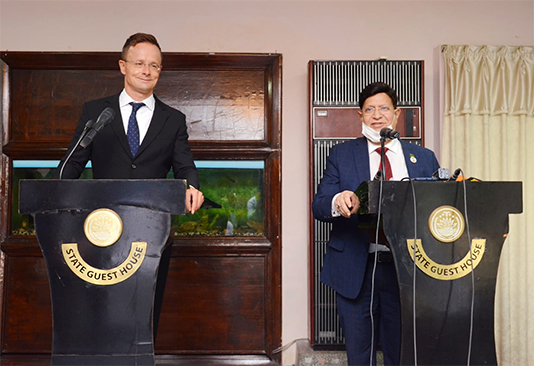DHAKA, Sept 10, 2020 (BSS) – Dhaka and Budapest today agreed to commence bilateral cooperation in the nuclear energy sector while Hungary announced to open consulate office here by next January to further strengthen ties between the two nations.
These were revealed in a joint press briefing arranged by Bangladesh foreign minister Dr A K Abdul Momen with his visiting Hungarian counterpart Peter Szijjarto after holding a bilateral meeting between Bangladesh and Hungary at State Guest House Padma in the capital.
After the meeting, the two foreign ministers also signed two instruments on the nuclear energy cooperation and training for diplomats on behalf of their respective countries.
“We agreed on a wide-ranging cooperation on educating and training nuclear engineers and nuclear experts (of Bangladesh),” Szijjarto told the media.
Hungary first installed the nuclear power plant in 1980 while it is currently installing the second nuclear power plant by Russian Rosatom.
“Our nuclear power plant is built by the same company that had also built (nuclear power plant) there (in Hungary) …. they (Hungary) have 40 years of expertise on it (nuclear energy) .. so, we would be sending around 30 students every year to Hungary for nuclear studies,” Momen said.
“We have the similar type of reactor, similar kind of structure .. so this is the chance to cooperate (between Dhaka and Budapest) in the field of training for nuclear engineers,” Szijjarto added.

The Hungarian foreign minister said his government has decided to open a consulate office in Dhaka by January next as there is no Hungarian permanent mission in Bangladesh.
He said that the consulate office here would be an extension of Hungarian New Delhi mission with permanent representatives as many Bangladeshi students are likely to study in Hungary and more and more Hungarian companies have been appearing in Bangladesh market.
About the Rohingya issue, Szijjarto said Hungary supports to ensure better circumstances so that every person in the world can have a secure life in his or her home.
“We have to promote repatriation (of Rohingyas) and we have to promote return of the displaced citizens (Rohingyas),” he said.
On the Rohingya repatriation issue, Dr Momen said, “We (Bangladesh and Hungary) agreed that Rohingyas should go back to their home.”
The Hungarian foreign minister said the visit of Prime Minister Sheikh Hasina to Hungary in 2016 had created huge encouragement in Budapest to enhance bilateral cooperation between the two countries.
He said considering Bangladesh’s tremors economic growth and its dense population the Hungarian companies have the opportunities to show up in this huge market.
Both the countries also agreed to increase cooperation on medical science, water management, tourism and counter terrorism.
Before the bilateral meeting, Szijjarto, who is also the minister for trade, also held a meeting with Commerce Minister Tipu Munshi at the secretariat.
During the meeting, Dhaka and Budapest decided to constitute a joint trade commission (JTC) soon to explore the opportunities of cooperation in the fields of trade and economy and other priority areas.
In the morning, Szijjarto first visited the Father of the Nation Bangabandhu Sheikh Mujibur Rahman Memorial Museum to pay tribute to memories of the country’s founding father and his family members who were brutally killed in 1975.
The Hungarian minister arrived here after midnight last night and left here this evening.
Hungary was one of the first countries to recognize Bangladesh just after few days of the country’s independence in 1971 while the diplomatic ties between the new born nation and the east European country were established on January 29, 1972.



